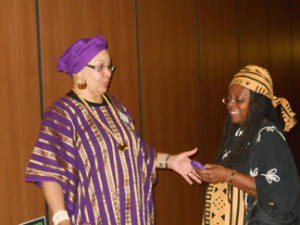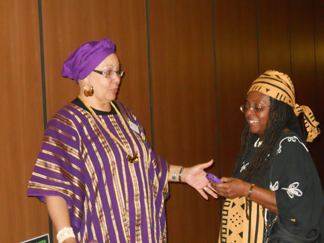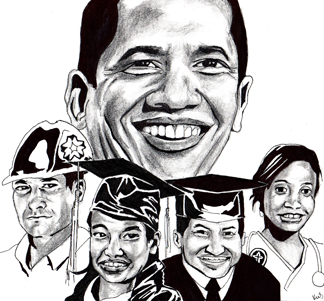By Amanda Marshall/reporter
Safisha Nzingha is Swahili for a beautiful, cleansing free spirit that brings peace to all she meets, a guest speaker told SE students Feb. 28.
Pamela “Safisha Nzingha” Hill spoke to students and faculty about black women who shaped foundations in American history and culture.
Carter G. Woodson started “Negro History Week” to coincide with the birthdays of Frederick Douglass and Abraham Lincoln. That week of recognition eventually became what is now known as Black History Month, Hill said. But Hill said she disagreed with Woodson’s inclusion of Lincoln.
“I don’t believe Lincoln was ‘the emancipator,’” she said. “I believe it was a political stunt.”
Hill’s history lesson began with Egypt.
“Egypt’s original name is Kemet, meaning black land,” she said. “Egypt is in Africa, not the Middle East.”

In African history, women were viewed as being equal to men, standing side by side and not behind as in many other cultures, Hill said. Queen Tiye, Nubian Queen of Kemet, was seen as the standard of beauty while Queen Nzinga of Angola was a warrior who fought alongside African men well into her 80s, she said.
Dreadlocks were also a part of black history, Hill said. When the British went to Jamaica to gain control of the colony, many slaves escaped from the plantations and joined a defiant army, calling themselves the Maroons, Hill said. These slaves with dreadlocks attacked the British, severing their heads and sending them rolling down the hills. The British spread word about the Maroons and feared the dreadlocked soldiers, thus the term came about.
One of their leaders was a woman, Queen Mother Nanny of the Maroons. She helped the slaves escape from the plantations, and her face is on the coins of Jamaican money today.
Among influential Americans was Harriet Tubman, who went into slavery 19 times to free slaves leading them along the Underground Railroad. Author Ida B. Wells-Barnett wrote about the lynching of men, women and children, and at 64, Anna Julia Haywood Cooper, an author, speaker and educator, became the fourth African-American woman to earn a doctorate. Bessie Coleman was the first black woman pilot and the first black to fly internationally while Mae Jemison was the first black woman to travel into space.
Hill holds a master’s degree in college teaching and a doctorate in adult learning. She has written and self-published three books and has taught at Paul Quinn College, the University of North Texas, Cedar Valley Community College and Texas A&M-Commerce.
A student asked Hill why the topics she discussed weren’t included in the history textbooks.
“You are more than a student,” Hill said. “If you want it, you have to ask for it. You have to demand it.”































